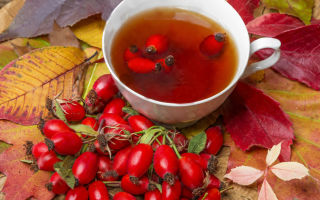Content
- 1 What does the rosehip look like and where does it grow?
- 2 Chemical composition
- 3 How is rosehip useful for the human body?
- 3.1 Why are rosehip leaves useful?
- 3.2 Why are rose hips useful?
- 3.3 Why is rosehip juice useful?
- 3.4 Why is rosehip compote useful?
- 3.5 Why is black rosehip useful?
- 3.6 Why is rosehip useful for colds
- 3.7 Is rose hips good for the kidneys
- 3.8 Is rose hips good for the liver and pancreas
- 3.9 Is rose hips good for diabetes
- 3.10 Is rose hips good for the stomach
- 3.11 Is rosehip good for the heart and blood vessels
- 3.12 Why rose hips are useful for women
- 3.13 Why is rosehip useful for men
- 3.14 Why is rosehip useful for children
- 4 Which rosehip is healthier - round or oblong
- 5 How to cook and eat rose hips
- 6 The use of rose hips in medicine
- 7 Rosehip increases or decreases blood pressure
- 8 The use of rose hips for weight loss
- 9 Application in cosmetology
- 10 Contraindications
- 11 Collection and procurement
- 12 Conclusion
- 13 Reviews about the benefits of rose hips for a woman's body
The beneficial properties of rose hips and contraindications deserve a detailed study. All parts of the plant are actively used by traditional medicine - both fruits and leaves are valuable.
What does the rosehip look like and where does it grow?
Rosehip is a perennial shrub from the Rose family. It rises up to an average of 2.5 m above the ground, the branches of the plant are drooping, arched, covered with red-green bark with sharp thorns. In May and June, rose hips bloom with pink buds up to 5 cm in diameter. In early autumn, it bears fruit - round or oblong berries, red-orange or black, depending on the variety.

Rosehip grows all over the world. You can meet shrubs in Siberia, in the central part of Russia, in Kamchatka and in Altai, in the Crimea. The plant is common in Europe and Asia, in Japan and China, in North America and even in Africa. Mostly wild rose chooses sparse mixed and deciduous forests for life; you can also see it in the forest-steppe, on river banks and along roads.
Chemical composition
The fruits, leaves and flowers of the wild rose contain a huge amount of valuable substances. Among them are:
- ascorbic acid;
- vitamins B1 and B2;
- sucrose and glucose;
- pectins;
- zinc,
- flavonoids and antioxidants;
- stearic and linoleic acids;
- carotenoids;
- essential oils and tanning components;
- selenium, cobalt and nickel;
- anthocyanins;
- arachidic and oleic acids;
- potassium, molybdenum, iron and manganese;
- alcohols;
- copper and aluminum;
- vitamins K and PP;
- tocopherol.
How is rosehip useful for the human body?
Wild rose fruits and leaves are beneficial to the body when consumed in almost any form. On their basis, drinks and desserts are prepared, raw materials are mixed with other medicinal components.
Why are rosehip leaves useful?
Wild rose leaf infusions are used as a relaxing and pain reliever. You can take them with inflammation and temperature, with colic in the intestines and joint diseases. Outwardly, leaf-based products are used to treat ulcers, wounds and burns, the wild rose contributes to the rapid healing of the skin. Rosehip flowers have similar medicinal properties and contraindications, which can be harvested simultaneously with herbs.
Why are rose hips useful?
The beneficial properties and contraindications of dried rose hips play a special role in the treatment of colds. Due to the increased content of ascorbic acid, the fruits help to quickly reduce the temperature and activate the immune system to fight infection. You can take decoctions and teas based on berries as a diuretic.
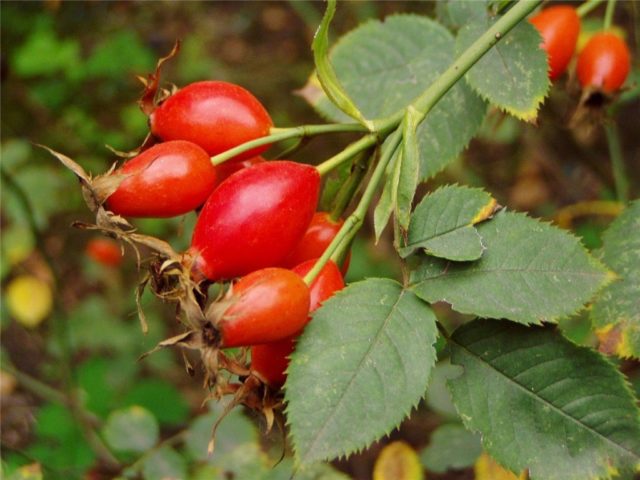
Why is rosehip juice useful?
Rosehip juice is a good natural remedy for cleansing blood vessels. When used regularly, it protects against the development of atherosclerosis, helps to reduce blood pressure and accelerate blood circulation. The juice is used to treat liver and kidney diseases; drinking it is useful for immunity and improving brain function.
Why is rosehip compote useful?
The medicinal properties, indications and contraindications of rose hips are preserved in compote. It is especially recommended for use in hypertension. You can drink it as a choleretic and diuretic, as well as to improve appetite and speed up metabolism. The drink is rich in iron, so it helps with anemia and low hemoglobin levels.
Why is black rosehip useful?
Rosehip is not only red but also black. In terms of composition, dark berries are similar to ordinary ones, but contain even more vitamin C, up to 80% of the daily value in 100 g. Teas and decoctions are made from such fruits, as well as syrups and wines, jams, jam and pastille. Berry-based drinks have expectorant properties and help with ARVI, bronchitis and even tuberculosis.
Why is rosehip useful for colds
With a runny nose, cough and high fever, the beneficial properties of wild rose hips help even better than raspberries or lemon. Teas and infusions based on wild rose fruits and leaves quickly bring down the heat, promote the elimination of toxins and stabilize the general condition.
Is rose hips good for the kidneys
Drinks made from the leaves and fruits of the plant have anti-inflammatory and diuretic properties. Wild rose is recommended for use in pyelonephritis, urolithiasis and sand in the kidneys.
Is rose hips good for the liver and pancreas
Wild rose promotes the removal of toxins, radionuclides and heavy metals from tissues. Against this background, the load on the liver decreases, and the restoration of the organ in case of diseases occurs faster. Natural acids and pectins in the composition stimulate the work of the pancreas and determine the benefits of rose hips in pancreatitis.
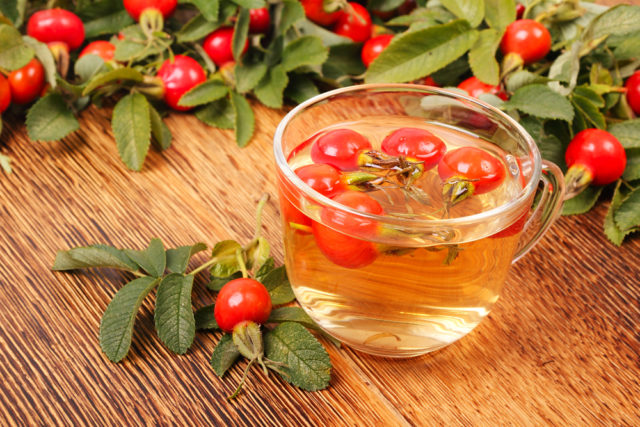
Is rose hips good for diabetes
The plant lowers blood sugar levels and normalizes hormones, and also helps fight edema. All of these properties are very beneficial in diabetes, as they improve the general condition and prevent complications.
Is rose hips good for the stomach
The health benefits and harms of rosehips for stomach diseases depend on the specific condition. Decoctions and infusions have a good effect with a reduced production of hydrochloric acid, as they accelerate digestion. But with gastritis with high acidity and with an exacerbated ulcer, drinks must be abandoned, they will lead to irritation of the mucous membranes.
Is rosehip good for the heart and blood vessels
Infusions based on the medicinal plant prevent the development of atherosclerosis, normalize blood flow and improve heart function. Rosehip can be taken with high cholesterol and fragile vessels.
Why rose hips are useful for women
Drinks on wild rose berries have a beneficial effect on the female hormonal background and are beneficial during menstruation and during menopause. The plant normalizes the emotional state, helps to cope with stress.
Why is rosehip useful for pregnant women?
The benefit of rose hips during pregnancy is that herbal decoctions suppress the manifestations of toxicosis and eliminate puffiness. You can take funds with increased nervousness, as well as to protect against viruses and colds.
Why is rosehip useful for men
Men can use decoctions and rosehip infusions for the treatment of prostatitis and ailments of the urinary tract. Regular use of drinks from fruits and leaves helps to improve potency, and the wild rose also protects against the development of cardiovascular diseases.
Why is rosehip useful for children
Rosehip is a fairly safe natural remedy for the child's body. It is offered to babies for colds, inflammation, digestive ailments and diarrhea.
Moreover, due to the high content of natural acids that can irritate the stomach and intestines, decoctions and infusions can only be given to children over six months old. The initial dosage should not exceed 20 ml.
Which rosehip is healthier - round or oblong
All varieties of wild and cultivated rose hips have valuable properties. However, round berries contain more vitamin C, and traditional medicine puts such fruits higher.
What are the most useful rosehip varieties
On the territory of Russia there are more than 60 useful species of rose hips, including cultivated ones. The most valuable from the point of view of chemical composition are the Large-fruited and Vitaminny varieties.
How to cook and eat rose hips
Traditional medicine offers several options for processing the fruits and leaves of the plant. In each case, the rosehip retains its maximum useful properties.
Fruit decoction
To prepare a medicinal decoction, you must:
- pour 1/2 cup of dried fruit with 1 liter of water;
- boil over low heat for five minutes under the lid;
- leave to infuse for another eight hours.
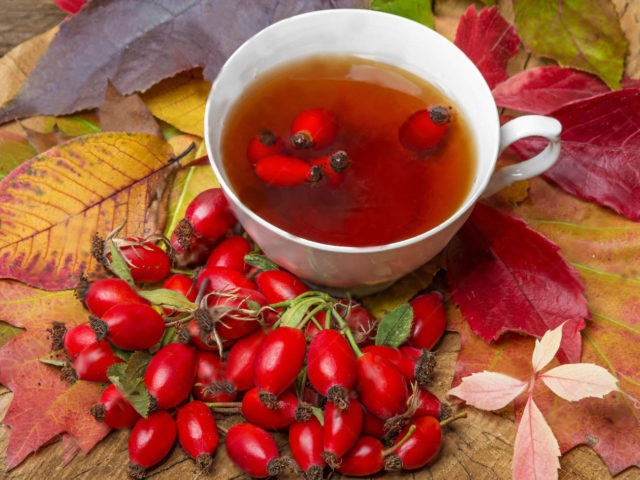
The filtered agent is consumed in 200 ml twice a day on an empty stomach.
Rosehip tea
Medicinal tea can be prepared in a thermos or a teapot. The recipe looks like this:
- two large spoons of chopped fruits are poured into the container;
- pour 300 ml of hot water;
- leave for ten minutes.
Ready tea is poured through a strainer into cups.
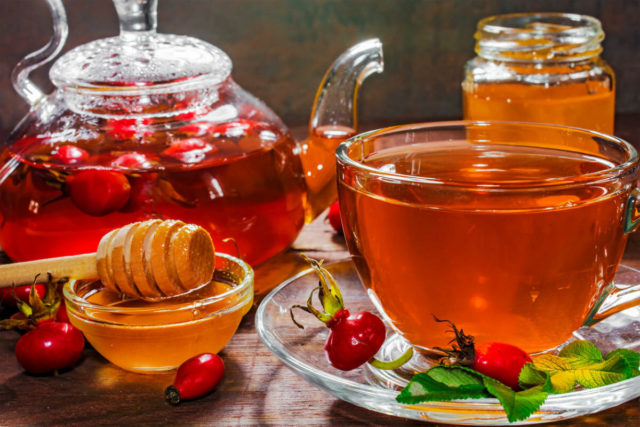
Infusion
To prepare a healing infusion, you must:
- pour 500 ml of boiling water over a large spoonful of chopped berries;
- leave under a lid or in a thermos overnight;
- filter through cheesecloth in the morning.
The product is drunk 150 ml three times a day on an empty stomach.
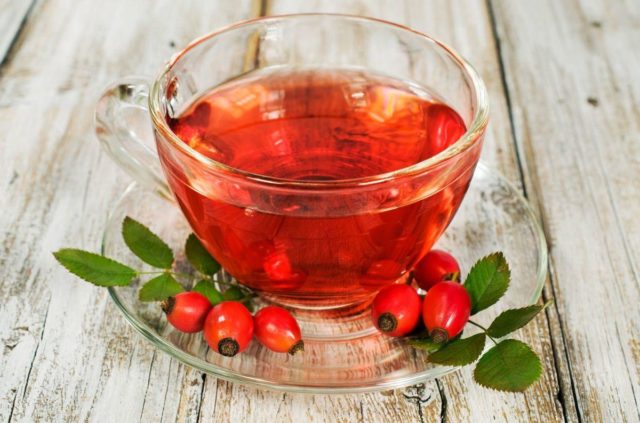
Syrup
A useful delicacy is prepared from wild rose berries according to this recipe:
- 1.5 kg of fresh fruits are washed, cleaned of antennae and sepals and boiled for 40 minutes over low heat;
- insist overnight, and then drain the broth and squeeze the berries through cheesecloth;
- 1.5 kg of sugar are added to the resulting mass and boiled until thick for another half hour.
The syrup can be taken in a large spoonful twice a day in pure form.
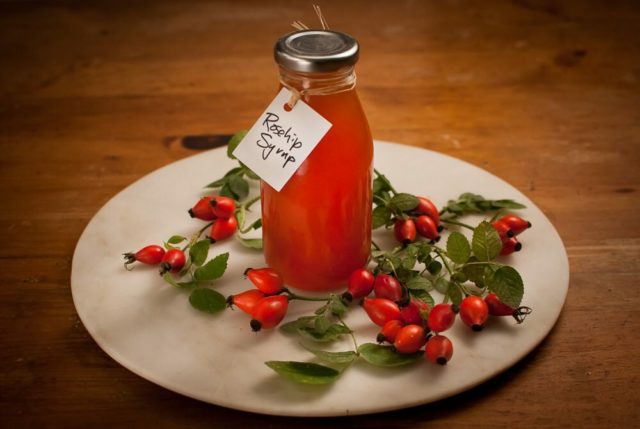
Compote
Rosehip compote quenches thirst well, pleases with a pleasant taste and, moreover, effectively strengthens the body. To prepare it you need:
- rinse and knead a glass of dry berries in a deep plate with a mortar;
- pour the fruits with 1.5 liters of boiling water and boil for ten minutes;
- remove the pan from the stove and let the compote cool to about 40 ° C.
If desired, at the very beginning of cooking, sugar can be added to the fruit to taste, however, unsweetened compote brings more benefits to the body.
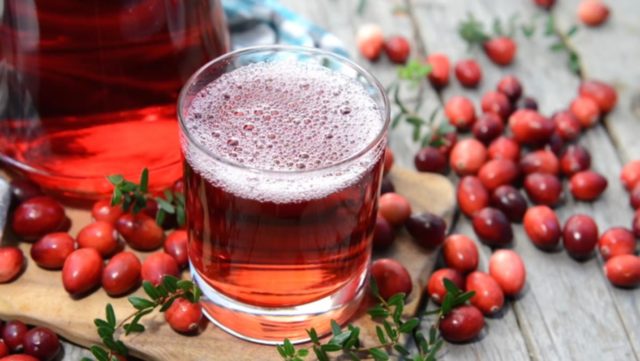
Jam
The healing properties of rose hips and contraindications are preserved in the jam, prepared according to a proven recipe. They do it like this:
- 1.2 kg of washed fruits are cut and seeds are removed;
- the berries are boiled over high heat for three minutes;
- the broth is poured into another saucepan and mixed with 1.2 kg of sugar;
- when the grains completely dissolve, add the remaining berries to the syrup;
- after boiling, the mass is boiled for another three minutes.
Then the jam must be removed from the heat and left under the lid for seven hours. Then the pan is put back on the stove and the mass is boiled for about 15 minutes, and then laid out in sterile jars and wrapped in a blanket until it cools.
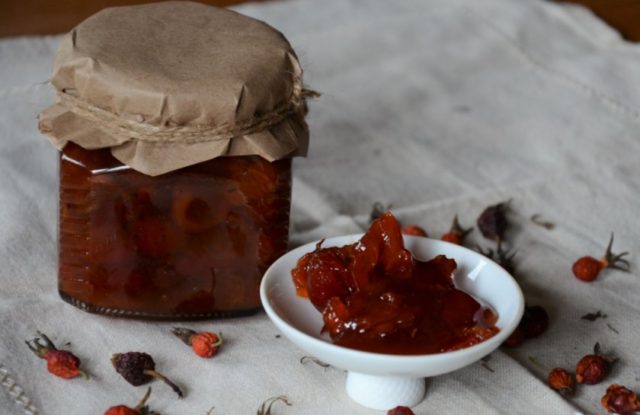
How much can you drink rose hips
The duration of the use of infusions and teas depends on the specific disease. But usually a wild rose is used for medicinal purposes no more than two months, after which you should take a break for 14 days.
Is it good to drink rose hips every day
Taking a wild rose on a daily basis is not only possible, but also very beneficial. This helps to achieve a therapeutic effect faster. In order not to manifest the harmful properties of rose hips, it is necessary to adhere to the recommended courses of treatment and pause in the continuous use of drinks.
The use of rose hips in medicine
Traditional medicine suggests using the wild rose for general strengthening of the body and relieving symptoms of diseases. Several recipes are especially popular.
Rosehip decoction with St. John's wort with exhaustion and weakness
The following collection helps to recover from serious illnesses and operations:
- two large tablespoons of dry fruits pour 500 ml of boiling water;
- boil for 20 minutes;
- add a large spoonful of dried St. John's wort to the hot broth;
- insist half an hour.
The ready-made collection is taken in 150 ml on a full stomach three times a day. In total, treatment continues for about a month.
Rosehip and Echinacea to strengthen the immune system
In the season of viruses and colds, it is especially useful to use this remedy:
- a usual decoction is prepared from 30 g of dry rose hips and 500 ml of water;
- pour the product into a small spoonful of dried echinacea;
- insist three hours and filter through cheesecloth.
You need to take the remedy during the day in small portions, the daily dosage is a glass. In total, the treatment continues for a week.
Collecting with rose hips for colds
A pronounced antipyretic effect is exerted by a remedy prepared according to this recipe:
- two large spoons of rose hips are mixed with an equal amount of dried raspberries;
- add a large spoonful of currant leaves;
- measure 20 g of the collection and pour 250 ml of boiling water;
- insist 20 minutes.
The finished product must be drained through cheesecloth. Drink medicinal tea in the evening shortly before bedtime, in the morning the symptoms of a cold should subside.
Rosehip with arrhythmia
The following collection helps to align the heart rate and reduce the risk of developing a heart attack:
- a decoction is prepared from three large spoons of wild rose fruits in 500 ml of boiling water;
- mix in equal amounts hawthorn flowers, crushed valerian root and motherwort;
- pour 10 g of the collection with a glass of rosehip broth;
- after cooling, they are placed on the stove and boiled for only a minute.
The collection is cooled and taken three times a day on an empty stomach, 50 ml.
Rosehip and hawthorn from atherosclerosis
With fragility of blood vessels and problems with blood circulation, the following remedy helps:
- first, an ordinary rosehip broth is prepared from two large spoons of berries and 500 ml of boiling water;
- after a couple of minutes of boiling, pour a large spoonful of hawthorn flowers with a hot product;
- under the lid, the drink is kept for two hours and filtered.
You need to take the broth in 1/4 cup half an hour before meals.
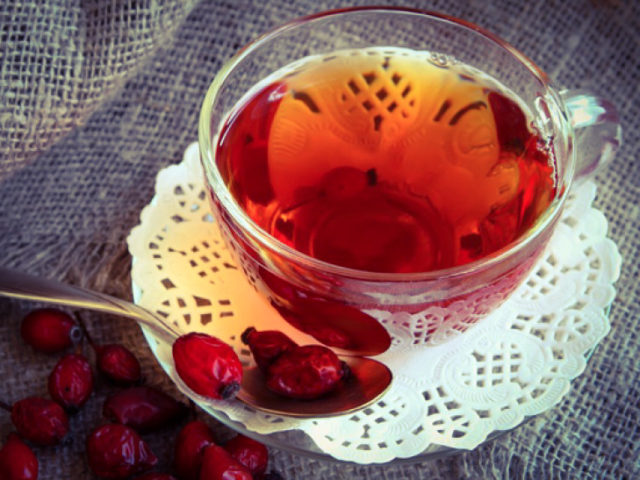
Rosehip decoction for sinusitis
With chronic inflammation of the maxillary sinuses, it is necessary:
- prepare rosehip broth and cool until warm;
- add seven drops of iodine and two grains of potassium permanganate to the product.
The nasal passages are washed with the solution three times a day.
Rosehip increases or decreases blood pressure
The effect of the medicinal properties of rose hips on pressure depends on the form of consumption of plant materials. Water decoctions and infusions have a hypotensive effect, it is useful to take them for hypertension. But alcohol tinctures increase blood pressure.
The use of rose hips for weight loss
On a diet, the benefits of rosehips on an empty stomach are clearly manifested, it removes toxins and fluids from the body, contributing to getting rid of excess weight. The broth is prepared as follows:
- three large tablespoons of fruits or leaves are poured into 1.5 liters of boiling water;
- boil for five minutes over medium heat;
- cool, and then bring to a boil again and keep in a water bath for another half hour.
The finished product is insisted for two hours, filtered and consumed on an empty stomach in a glass three times a day.
Application in cosmetology
Rosehip has a beneficial effect on skin and hair. You can use decoctions and water infusions for daily washing, the products will help cleanse the skin of acne, normalize fat content and increase the elasticity of the epidermis. If you use a wild rose to rinse your curls after a regular wash, the strands will become stronger, acquire a healthy shine and stop falling out.
Contraindications
The benefits and harms of rose hips for the human body depend on the presence of contraindications. It is impossible to use herbal remedies based on wild rose when:
- individual allergies;
- varicose veins and thrombophlebitis;
- stomach ulcer and gastritis with high acidity in the acute stage;
- endocarditis;
- chronic heart failure.
With caution, the use of wild roses is suitable during pregnancy. In general, herbal remedies are useful during the period of bearing a child, but in case of an overdose, they can provoke a miscarriage, large amounts of vitamin C increase the uterine tone.
Collection and procurement
Rosehip berries are harvested in September and October, when they are fully ripe. The fruit should be bright orange, red or black depending on the variety, firm and glossy. Leaves are harvested during the flowering period in May and June.
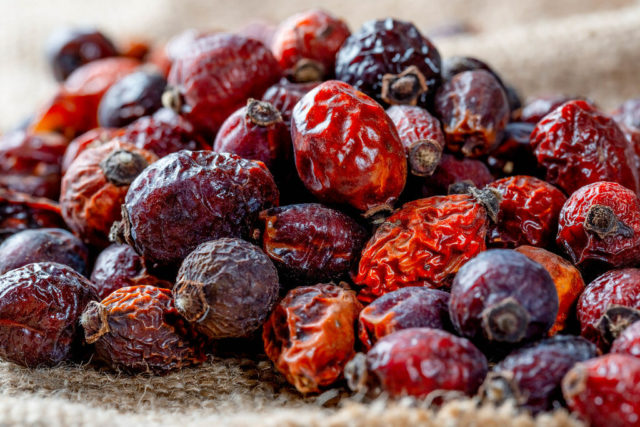
It is best to dry plant materials in the fresh air in the shade, spreading them in a thin layer on a flat surface. It is also permissible to place fruits and leaves in an oven or dryer, but the temperature should not exceed 50 ° C. After evaporation of moisture, medicinal raw materials are laid out in paper bags or linen bags and stored in a dark and dry cabinet. Harvested fruits can be used for two years, leaves - for a year.
Conclusion
The beneficial properties of rose hips and contraindications affect almost all body systems. Subject to the dosages indicated in the recipes, decoctions and teas based on wild rose will have a strengthening and anti-inflammatory effect.
Reviews about the benefits of rose hips for a woman's body

